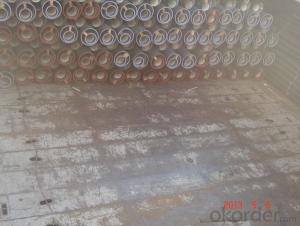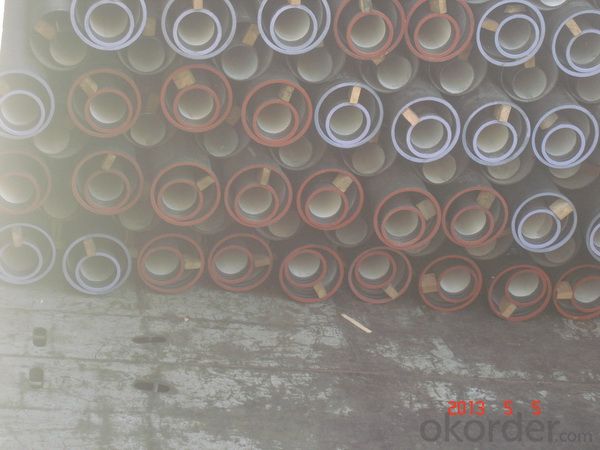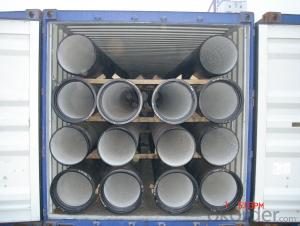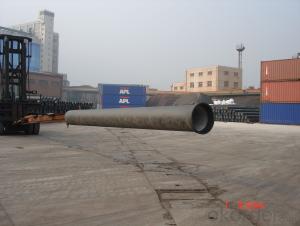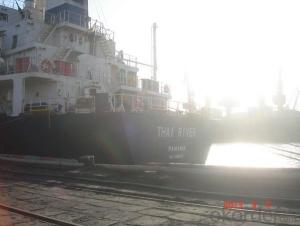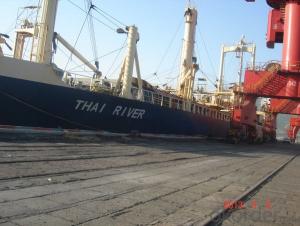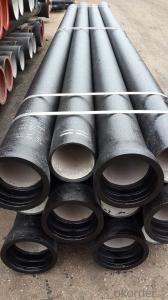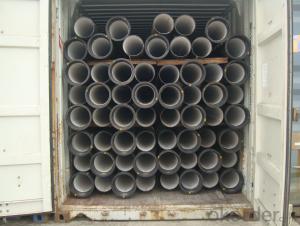DUCTILE IRON PIPES AND PIPE FITTINGS C CLASS DN800
- Loading Port:
- Tianjin
- Payment Terms:
- TT OR LC
- Min Order Qty:
- 22 pc
- Supply Capability:
- 3000 pc/month
OKorder Service Pledge
OKorder Financial Service
You Might Also Like
Material : Ductile Cast Iron
Size Range : DN 80mm to DN 2000mm
Unit Effective Length : 6m or 5.7m
Manufacture Standard: ISO 2531:1998/ EN 545:2006/EN 598:2007
Annual capacity : 200,000 tons
Coating Exterior: Zinc 130g/m2 according to ISO 8179-1 and bitumen coating 70 microns.
Cement Interior: Portland Cement/ High Alumina Cement/ Sulphate Resisting Cement Lining according to ISO 4179
Special requirements on external coating and internal lining can be applied
We also provide accessories such as SBR/EPDM rubber gaskets, lubricant paste, pipe caps, PE sleeves, etc.
Additional Parts:
Each pipe is strictly inspected according to related standard to ensure permanently high performance.
Easy Installation at site and service free for life
Long Service Lifespan
Quotation will arrive you within 24hours once we get your inquiry.
We guarantee offering you a competitive price.
A copy of original inspection reports of pipes will be offered after shipment.
Photos of loading process will be sent to the customer after shipment effect.
We will follow-up the delivery progress after shipment effect and update to the customer on weekly basis.
- Q: Can ductile iron pipes be used for water distribution networks?
- Water distribution networks can utilize ductile iron pipes. Ductile iron, a type of cast iron known for its strength and flexibility, is well-suited for a variety of applications, including water distribution systems. Due to their durability, resistance to corrosion, and long lifespan, ductile iron pipes have been widely used in water supply networks. These pipes are capable of withstanding high pressure and are resistant to external loads and ground movement, making them an ideal choice for underground installations. Additionally, ductile iron pipes are commonly used for transporting safe drinking water as they are non-toxic and do not contaminate the water supply. Moreover, ductile iron pipes possess excellent hydraulic properties, ensuring efficient water flow and minimizing friction losses. Their smooth interior surface prevents the accumulation of deposits, reducing the risk of clogs and maintaining a consistent water flow. In summary, ductile iron pipes offer a reliable and effective solution for water distribution networks, guaranteeing the safe and efficient transportation of water to communities and industries.
- Q: What are the typical joint restraint requirements for ductile iron pipes?
- The typical joint restraint requirements for ductile iron pipes involve the use of mechanical joint restraints, such as thrust blocks or tie rods, to prevent the pipe from separating or moving under internal pressure or external forces. These restraints ensure the stability and integrity of the pipeline system.
- Q: How are ductile iron pipes repaired if they get damaged?
- Ductile iron pipes are typically repaired using various methods depending on the extent of the damage. Common repair techniques include spot repair, where damaged sections are cut out and replaced with new pipe sections, and trenchless repair methods such as pipe lining or pipe bursting. These methods minimize disruption and excavation while ensuring the structural integrity of the pipe is restored.
- Q: How is ductile iron pipe tested for quality?
- Extensive quality testing is carried out on ductile iron pipe to ensure its performance and reliability in various applications. The pipe undergoes a series of steps to assess its physical and mechanical properties. The hydrostatic pressure test is one of the main tests performed on ductile iron pipe. This test involves subjecting the pipe to fluid pressure that exceeds its designed operating pressure. The purpose is to determine if the pipe can withstand internal pressure without any leakage or failure. The pipe is filled with water or another suitable fluid, and the pressure is gradually increased to the required level. During this test, the pipe is carefully inspected for any signs of leakage or deformation. Another essential test is the tensile strength test, which measures the pipe's ability to resist pulling or stretching forces. A sample of the pipe is pulled until it breaks, and the maximum force applied during the test is recorded. This test helps determine important properties such as the pipe's ultimate tensile strength, yield strength, and elongation. The Charpy test is used to assess the pipe's impact resistance. In this test, a notched sample is struck with a swinging pendulum to measure the amount of energy absorbed by the pipe. It helps determine if the pipe can withstand sudden impacts or loads without fracturing. In addition to these tests, the pipe also undergoes various non-destructive tests, including ultrasonic testing, magnetic particle inspection, and visual inspection. These tests are crucial in detecting any internal or external defects, cracks, or abnormalities that could compromise the pipe's structural integrity. Furthermore, chemical analysis and metallographic examination are performed to evaluate the chemical composition and microstructure of the ductile iron pipe. These tests ensure that the pipe meets the necessary specifications and standards for its intended application. Overall, the testing process for ductile iron pipe is thorough and stringent. Its purpose is to guarantee the pipe's quality, durability, and overall performance in safely and efficiently delivering water, wastewater, or other fluids.
- Q: What is the difference between ductile iron and cast iron pipes?
- Ductile iron and cast iron pipes are both popular materials used in plumbing systems, but they have distinct differences in terms of composition, strength, and flexibility. 1. Composition: Ductile iron pipes are made from ductile iron, which is a type of cast iron that has been treated with trace amounts of magnesium to enhance its flexibility and strength. On the other hand, cast iron pipes are made from regular cast iron, which is more brittle and less malleable. 2. Strength: Ductile iron pipes are significantly stronger than cast iron pipes. Ductile iron has a higher tensile strength, meaning it can withstand higher levels of internal and external pressure. This makes it more suitable for applications where high strength is required, such as water mains or sewer lines. Cast iron pipes, on the other hand, are more prone to cracking or breaking under pressure. 3. Flexibility: Ductile iron pipes have greater flexibility compared to cast iron pipes. This flexibility allows them to withstand ground movement, making them less susceptible to damage or breakage caused by settling or shifting soil. Cast iron pipes, due to their inherent brittleness, are more likely to crack or separate when exposed to ground movement or vibrations. 4. Installation: Ductile iron pipes are typically joined using a mechanical joint or flanged joint, which provides a secure and leak-proof connection. On the other hand, cast iron pipes are usually joined using a bell-and-spigot joint, which relies on gaskets or lead caulking to create a seal. The mechanical joint used in ductile iron pipes offers better resistance to movement and external forces. 5. Cost: Ductile iron pipes are generally more expensive than cast iron pipes. The additional treatment process and higher strength of ductile iron contribute to the increased cost. However, the added durability and longer lifespan of ductile iron pipes can offset the initial investment, as they may require fewer repairs or replacements over time. In summary, the main differences between ductile iron and cast iron pipes lie in their composition, strength, flexibility, installation methods, and cost. Ductile iron pipes offer superior strength and flexibility, making them more suitable for demanding applications, while cast iron pipes are more brittle and prone to breakage. Ultimately, the choice between the two depends on the specific requirements of the plumbing system and the available budget.
- Q: What are the different sizes available for ductile iron pipe?
- Ductile iron pipes come in a wide variety of sizes to meet the needs of different applications in the water and wastewater industry. These pipes typically range in diameter from 3 inches to 64 inches. The most commonly used sizes are 4 inches, 6 inches, 8 inches, 10 inches, 12 inches, 16 inches, 20 inches, 24 inches, 30 inches, and 36 inches. However, larger sizes can also be manufactured for specific project requirements. Having different sizes available allows for flexibility in designing and constructing water distribution systems, sewage networks, and other infrastructure projects. The choice of the appropriate size depends on factors like the volume of flow, pressure requirements, and the distance the pipe needs to cover. It's important to note that the size of a ductile iron pipe refers to its internal diameter, which is also known as the nominal bore. The actual outside diameter of the pipe may vary slightly depending on the manufacturer and the specific dimensions provided. When selecting a size for ductile iron pipes, it's crucial to consider factors such as hydraulic capacity, installation requirements, and compatibility with other pipeline components. Seeking advice from engineers and industry experts is recommended to ensure the correct size is chosen for each particular application.
- Q: What are the different lining materials available for ductile iron pipe?
- Some of the different lining materials available for ductile iron pipe include cement mortar lining, polyurethane lining, polyethylene lining, and epoxy lining. These linings help to protect the pipe from corrosion and extend its lifespan.
- Q: Are ductile iron pipes suitable for use in food processing plants?
- Yes, ductile iron pipes are suitable for use in food processing plants. Ductile iron is highly durable and corrosion-resistant, making it suitable for transporting various fluids in food processing facilities. Additionally, ductile iron pipes are approved for use in potable water systems, further indicating their suitability for food-related applications.
- Q: Can ductile iron pipes be repaired if they get damaged?
- Yes, ductile iron pipes can be repaired if they get damaged. The repair process typically involves cutting out the damaged section and replacing it with a new pipe segment or using repair clamps to fix minor leaks or cracks.
- Q: Can ductile iron pipes be used for wastewater treatment plants?
- Yes, ductile iron pipes can be used for wastewater treatment plants. Ductile iron pipes are known for their strength and durability, making them suitable for handling the harsh and corrosive environment of wastewater treatment plants. These pipes can withstand high pressures and are resistant to corrosion, which is essential in handling wastewater and various chemicals involved in the treatment process. Ductile iron pipes also have the advantage of being easy to install and maintain, with a long service life. Therefore, they are commonly used in wastewater treatment plants for transporting and distributing wastewater throughout the facility.
Send your message to us
DUCTILE IRON PIPES AND PIPE FITTINGS C CLASS DN800
- Loading Port:
- Tianjin
- Payment Terms:
- TT OR LC
- Min Order Qty:
- 22 pc
- Supply Capability:
- 3000 pc/month
OKorder Service Pledge
OKorder Financial Service
Similar products
Hot products
Hot Searches
Related keywords
